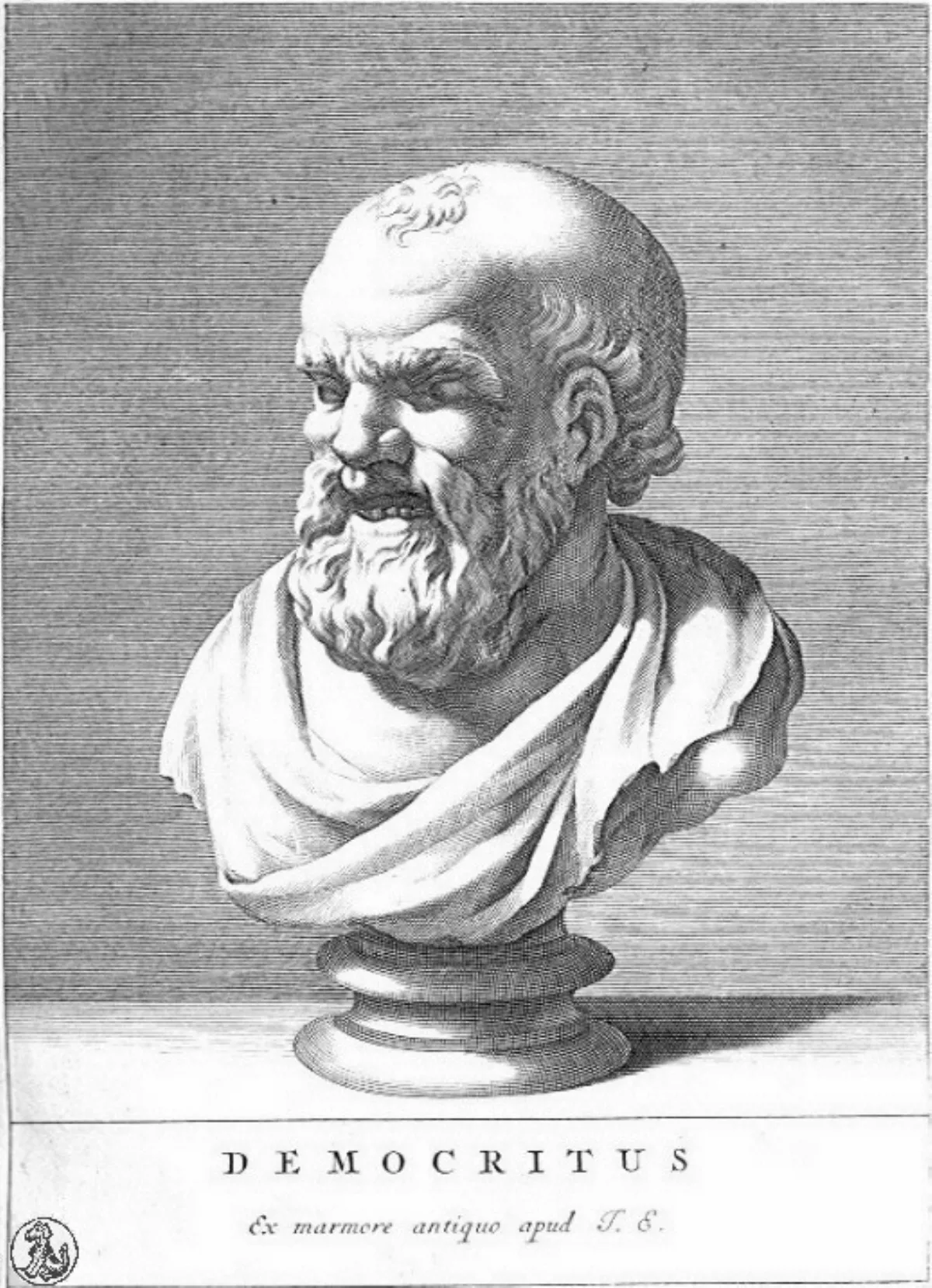 1.
1. Democritus was known in antiquity as the 'laughing philosopher' because of his emphasis on the value of cheerfulness.

 1.
1. Democritus was known in antiquity as the 'laughing philosopher' because of his emphasis on the value of cheerfulness.
Democritus was a polymath and prolific writer, producing nearly eighty treatises on subjects such as poetry, harmony, military tactics, and Babylonian theology.
Democritus spent the inheritance, which his father left him, on travels into distant countries, which he undertook to satisfy his extraordinary thirst for knowledge.
Democritus travelled over a great part of Asia, and, as some state, he even reached India and Aethiopia.
Democritus himself declared, that among his contemporaries none had made greater journeys, seen more countries, and made the acquaintance of more men distinguished in every kind of science than himself.
Democritus mentioned many Greek philosophers in his writings, and his wealth enabled him to purchase the works they had written.
Democritus thus succeeded in excelling, in the extent of his knowledge, all the earlier Greek philosophers, among whom Leucippus, the founder of the atomistic theory, is said to have exercised the greatest influence upon his philosophical studies.
The many anecdotes about Democritus which are preserved, especially in Diogenes Laertius, show that he was a man of a most sterling and honourable character.
Democritus's diligence was incredible: he lived exclusively for his studies, and his disinterestedness, modesty, and simplicity are attested by many features which are related of him.
Democritus's fellow-citizens honoured him with presents in money and bronze statues.
We cannot leave unnoticed the tradition that Democritus deprived himself of his sight, in order to be less disturbed in his pursuits.
Democritus's death is placed in the 4th year of the 105th Olympiad, or 357 BC, in which year Hippocrates is said to have died.
Democritus himself called the common notion of chance a cover of human ignorance, and an invention of those who were too idle to think.
Democritus surmised that there are many worlds, some growing, some decaying; some with no sun or moon, some with several.
Democritus held that every world has a beginning and an end and that a world could be destroyed by collision with another world.
Democritus concluded that divisibility of matter comes to an end, and the smallest possible fragments must be bodies with sizes and shapes, although the exact argument for this conclusion of his is not known.
Atoms, Democritus believed, are too small to be detected by the senses; they are infinite in numbers and come in infinitely many varieties, and they have existed forever and that these atoms are in constant motion in the void or vacuum.
Besides the infinite number of atoms existing in infinite space, Democritus supposed the existence of an infinite number of worlds, some of which resembled one another, while others differed from one another, and each of these worlds was kept together as one thing by a sort of shell or skin.
Democritus derived the four elements from the form of the atoms predominating in each, from their quality, and their relations of magnitude.
Democritus derived the soul, the origin of life, consciousness, and thought, from the finest fire-atoms; and in connexion with this theory he made very profound physiological investigations.
Democritus was a pioneer of mathematics and geometry in particular.
Democritus thought that the first humans lived an anarchic and animal sort of life, foraging individually and living off the most palatable herbs and the fruit which grew wild on the trees, until fear of wild animals drove them together into societies.
Democritus believed that these early people had no language, but that they gradually began to articulate their expressions, establishing symbols for every sort of object, and in this manner came to understand each other.
Democritus says that the earliest men lived laboriously, having none of the utilities of life; clothing, houses, fire, domestication, and farming were unknown to them.
The ethics and politics of Democritus come to us mostly in the form of maxims.
Democritus wrote a treatise on the purpose of life and the nature of happiness.
Democritus held that "happiness was not to be found in riches but in the goods of the soul and one should not take pleasure in mortal things".
Democritus stated that "the cause of sin is ignorance of what is better", which become a central notion later in the Socratic moral thought.
Later Greek historians consider Democritus to have established aesthetics as a subject of investigation and study, as he wrote theoretically on poetry and fine art long before authors such as Aristotle.
Democritus was nevertheless well known to his fellow northern-born philosopher Aristotle, and was the teacher of Protagoras.
The importance which was attached to the researches of Democritus is evident from the fact, that Aristotle is reported to have written a work in two books on the problems of Democritus.
Democritus's works were composed in the Ionic dialect, though not without some admixture of the local peculiarities of Abdera.
Democritus is evoked by English writer Samuel Johnson in his poem, The Vanity of Human Wishes, ll.